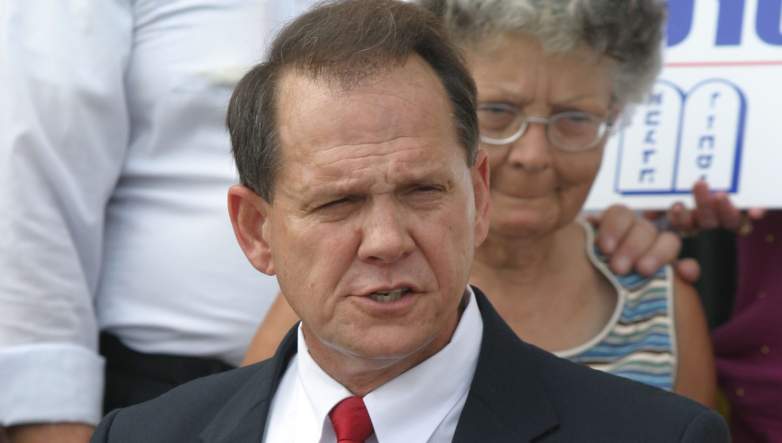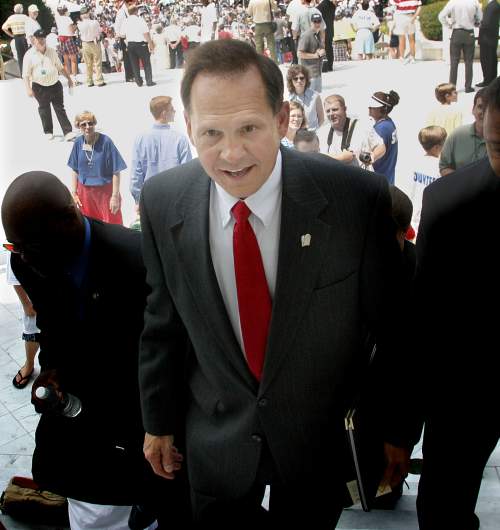
Roy Moore, the controversial former chief justice of the Alabama Supreme Court, is the Republican nominee to assume the seat vacated by Jeff Sessions, Donald Trump’s attorney general. He’s also the subject of accusations that he was involved with or asked out girls under the age of 18 when he was an assistant district attorney in his 30s, which were first reported in The Washington Post.
(Note: Alabamans headed to the polls on December 12. You can read live election results and updates here.
Moore’s campaign denied the allegations and called them a “desperate political attack” from Democrats and The Washington Post. Moore has made religion front and center of his public life for years.
In the primary, Moore defeated Luther Strange, the incumbent via gubernatorial appointment, who was heartily endorsed by both Donald Trump and Republican Majority Leader Mitch McConnell. He is facing Democrat Doug Jones in the closely watched Senate election.
Bombastic and defiant, underfunded, prone to controversial statements (including about Vladimir Putin), and railing against Washington elites, Moore, ironically, may have captured some of the narrative that propelled Trump into the White House. He’s also a Vietnam veteran and former prosecutor.
Moore, a Republican, received national attention for his defiance over the Ten Commandments and same-sex marriage. Jones is a former U.S. Attorney.
Here’s what you need to know:
1. Moore, Who Was Removed as Chief Justice For Refusing to Remove a Ten Commandments Monument, Was Accused By Multiple Women

Supporters of Alabama Chief Justice Roy Moore rally outside the judicial building August 26, 2003 in Montgomery, Alabama. A 5,300-pound sculpture of the Ten Commandments remained in the building’s rotunda after a federal court order called for its removal.
The Washington Post story quotes four accusers, and the women are named in the story. One alleged sexual contact when she was 14 and Moore was 32. “Wendy Miller says she was 14 and working as a Santa’s helper at the Gadsden Mall when Moore first approached her, and 16 when he asked her on dates, which her mother forbade. Debbie Wesson Gibson says she was 17 when Moore spoke to her high school civics class and asked her out on the first of several dates that did not progress beyond kissing. Gloria Thacker Deason says she was an 18-year-old cheerleader when Moore began taking her on dates that included bottles of Mateus Rosé wine. The legal drinking age in Alabama was 19,” the newspaper reported. The story starts with accuser Leigh Corfman, who says she “had sexual contact with Moore that went beyond kissing. She says they did not have intercourse.” She was 14 at the time. He was 32, and a single assistant district attorney, and the year was 1979.
Other women have since come forward. Moore denies all of the allegations. He has pointed to the belated admission by one accuser that she wrote part of a yearbook passage she says was signed by Moore.
Moore endeared himself to some on the right when he was removed as Alabama’s chief justice in 2003 “for refusing to remove a monument to the Ten Commandments,” reports FiveThirtyEight. The Moore saga doesn’t end there, though. After being removed as chief justice, he won reelection.
In 2003, reads his Alabama Supreme Court bio, “Chief Justice Moore was removed from his position by a judicial panel for refusing to remove a Ten Commandments monument that he installed in the rotunda of the Alabama Judicial Building to acknowledge the sovereignty of God.”
In the Senate race, Moore ran as an underfunded outsider against the Washington machine. He told Politico, “I resent people from Washington, raising money in Washington, and sending negative ads to Alabama and trying to control the vote of the people. If the Washington crowd wants somebody, the people of Alabama generally don’t.”
Politico dubbed him a “GOP rebel.” If Moore wins, wrote Politico, “his bombastic personality and antipathy toward Mitch McConnell (R-Ky.) are sure to make more trouble for the GOP leader.”
2. Moore Declined to Enforce the Supreme Court’s Same-Sex Marriage Decision & Was Suspended

GettyRoy Moore.
The Ten Commandments controversy wasn’t the last high-profile moment of defiance for Moore.
Next, he was “suspended for declining to enforce the 2015 U.S. Supreme Court decision that legalized same-sex marriages. After losing an appeal, he resigned in April,” reports Politico.
Moore’s bio touches on this, saying, “Chief Justice Moore was overwhelmingly re-elected by a vote of the people of Alabama as Chief Justice in November of 2012 and took office in January of 2013. On September 30, 2016, Chief Justice Moore was suspended from office for the remainder of his term. On April 26, 2017, Chief Justice Moore retired.”
All of this earned Moore diehard supporters on the right (as well as the enmity of others), which served him well in a fractured GOP primary field. According to The New York Times, “a low turnout would be good for Moore, many experts believe, because “his defiance has only endeared him to his supporters, who are highly likely to show up to vote in any contest where he appears on the ballot.”
3. Moore Served in the Military Police in Vietnam & Calls the Controversies the Result of Standing Up ‘for Truth’

GettyRoy Moore.
Moore is a Vietnam veteran.
According to his Chief Justice biography, he “graduated from Etowah High School in Attalla, Alabama, in 1965, and from the U.S. Military Academy at West Point in 1969. He served in the U.S. Army as a company commander with the Military Police Corps in Vietnam. Chief Justice Moore completed his Juris Doctor degree from the University of Alabama School of Law in 1977.”
“What I’ve done is stand for my country, stand for my Constitution, and I’ve suffered accordingly,” Moore, 70, told Politico. “I think controversy will follow you if you stand up for truth. It’s that simple. If you stand up for truth, you’re going to have consequences.”
4. Moore Is a Former Prosecutor Who Made Controversial Comments About Putin & Transgender Troops

GettyAlabama Chief Justice Roy Moore leaves a rally in support of a monument of the Ten Commandments August 16, 2003 in Montgomery, Alabama.
Moore has also created recent controversies with some of his outspoken comments. According to Politico, he told The Guardian that Vladimir Putin is “maybe … more akin to me than I know” because Putin opposes gay marriage, and, of transgender troops, he said, “If we’re going to file for hormone treatments and medical surgeries, that’s not making your military stronger. You’ve got to have a disciplined military.”
Moore “became the first full-time Deputy District Attorney in Etowah County, Alabama, and served in this position from 1977 until 1982. In 1984, Chief Justice Moore undertook private practice of law in Gadsden, Alabama,” according to the bio.
In 1992, Moore became a judge in Alabama, serving “until his election as Chief Justice of the Alabama Supreme Court in 2000.”
“From 2003 until 2012, Chief Justice Moore served as President of the Foundation for Moral Law in Montgomery, speaking throughout the Country and filing amicus curiae briefs regarding the United States Constitution in Federal District Courts, State Supreme Courts, U.S. Courts of Appeal and the United States Supreme Court,” the bio notes.
5. Moore Is Married With Four Children & Is Also a Grandfather
Moore and his wife Kayla “have four children and three grandchildren. They are members of First Baptist Church in Gallant, Alabama,” his bio reads.